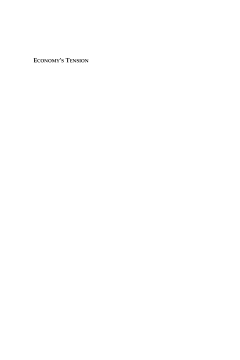
Additional Information
Book Details
Abstract
Why are we obsessed with calculating our selections? The author argues that competitive trade nurtures calculative reason, which provides the ground for most discourses on economy. But market descriptions of economy are incomplete. Drawing on a range of materials from small ethnographic contexts to global financial markets, the author shows that economy is dialectically made up of two value realms, termed mutuality and impersonal trade. One or the other may be dominant; however, market reason usually cascades into and debases the mutuality on which it depends. Using this cross-cultural model, the author explores mystifications of economic life, and explains how capital and derivatives can control an economy. The book offers a different conception of economic welfare, development, and freedom; it presents an approach for dealing with environmental devastation, and explains the growing inequalities of wealth within and between nations.
Stephen Gudeman received his PhD in Anthropology from Cambridge University and an M.B.A. from Harvard Business School. He is Professor of Anthropology at the University of Minnesota and has carried out fieldwork in Panama, Colombia, Guatemala and Cuba. He works at the intersection of anthropology and economics. His books include The Anthropology of Economy (Blackwell), Conversations in Colombia, with Alberto Rivera (Cambridge UP), Economics as Culture (Routledge), and The Demise of a Rural Economy (Routledge).
“[The author] does not shy away from this controversial aspect of his book; to the contrary, he asserts his stand in a forceful manner, but in a language that is marked by its remarkable clarity and absence of polemic. For the open-minded reader concerned with fundamental questions about notions of ‘economy’ and ‘value’, this book contains many thought-provoking ideas.” · New Political Economy
“Gudeman’s model is thought provoking and his elaboration of it – in chapters focused on trade, money, property and other phenomena – is sophisticated. His conclusions might be said to reproduce anthropological (or at least substantivist) orthodoxy, to some extent, but his framing of this orthodoxy is original and important. Among other things, Gudeman accepts that economists’ models do, after all, have a certain relevance in most of the world, and not just in the “late capitalist” West. As a result, this suggests why economists and anthropologists might profit from having critical conversations that genuinely cut in both directions.” · Anthropology of this Century
"As well as containing stimulating arguments interspersed with engaging ethnographic examples, this book is admirably lucid in style. Few other anthropologists have such a grasp of [economic] theory, and in the present work he illuminates not only the tension between community and market, but also that between anthropology and economics." · JRAI
"A clear and compelling account of the symbiotic relationship between the market and the 'base' of mutual relationships that normally empower as well as constrain the market, the tension of the title. Stephen Gudeman convincingly argues the necessity of this tension, not only for economic sanity but for economic 'progress' as it is conventionally defined. This book is must reading for social scientists, particularly for economists." · Stephen Marglin, Harvard University, and author of The Dismal Science: How Thinking Like an Economist Undermines Community
"The work represents a significant contribution by a distinguished economic anthropologist who has done much to shape the subdiscipline in recent decades. The author's command of economic theory and issues is impressive, perhaps greater than that of any anthropologist working in the area today." · Mark Moberg, University of South Alabama
"This book is a breath of fresh air in the arid field of economics. It articulates a humane perspective on the economy with notions that matter for how we read the economic lives we are living. The book is a must for anyone who needs or wants to open the eyes for the full range of values that constitute economic processes. I learned a lot from the studying it." · Arjo Klamer, Erasmus University
"Economy's Tension is a call for a cultural shift in the way we think about the economy. Gudeman focuses on the conflict between 'mutuality' and 'markets,' that is between the meaning humans seek in community and that embodied in the 'price fetishism' that underpins market rationality. But Gudeman's highly readable and intellectually broad account is much more than a post-Marxist cultural critique. He goes beyond the oft-heard critique of global neoliberalism to propose a deeper shift in economic thought. This book is an important cultural reading of twenty-first-century capitalism that will be of much interest to social scientists of all disciplines." · William Milberg, New School for Social Research
"Gudeman makes a sterling effort in organising diverse concepts and theories into a coherent body of knowledge. In addition, the strength of the book lies in its elegant shifts between the general and particular. Highly abstract thoughts are tied to particular ethnographic examples that illustrate and explain the author's argument. This is a most successful strategy which helps the reader to understand thoughts which are far from trivial." · Durham Anthropology Journal
Table of Contents
| Section Title | Page | Action | Price |
|---|---|---|---|
| Title page-Economy's Tension | i | ||
| Contents | v | ||
| Acknowledgments | vii | ||
| Chapter 1-Models, Mutuality, and Trade | 1 | ||
| Chapter 2-Exchange as Mutuality | 27 | ||
| Chapter 3-Trade's reason | 48 | ||
| Chapter 4-Property and base | 74 | ||
| Chapter 5-Contingency or Necessity? The dialectic of practices | 95 | ||
| Chapter 6-Making money | 124 | ||
| Chapter 7-Seeking a balance | 148 | ||
| References | 166 | ||
| Index | 182 |
